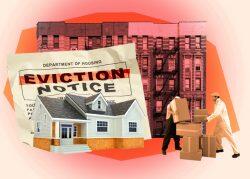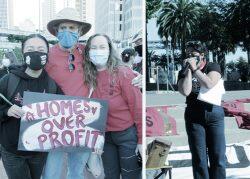 End of moratorium did not result in mass evictions
End of moratorium did not result in mass evictions
Trending
Can LA landlords get to Supreme Court on evictions?
Regional apartment association finds new ally in DC civil liberties group, sees path with NY ruling

The residential real estate market could know in a matter of weeks whether the highest court in the land might give Los Angeles landlords a hearing on eviction moratoriums.
It’s a legal fight that began in what seems now like a different era, soon after Covid 19 pandemic’s first terrifying wave.
In March of 2020, in response to the broad economic collapse caused by still-novel pandemic shutdowns, the City of Los Angeles enacted its first eviction moratorium and rent freeze, local ordinances intended to protect vulnerable renters. Many area landlords, however, felt their livelihoods were being unfairly sacrificed. That June the region’s largest landlord trade group struck back, filing a legal challenge that aimed to nix the laws.
More than a year and a half later, L.A.’s moratorium is still in place, and the Apartment Association of Greater Los Angeles (AAGLA) is still fighting it — along with a new ally in the form of an influential legal advocacy group that’s urging the country’s highest court to take on the landlords’ challenge.
“It would be worrying if the Supreme Court doesn’t grant review in either this case or one like it,” said Jared McClain, the lead attorney on the matter for the New Civil Liberties Alliance, the Washington, D.C.-based organization that joined AAGLA’s fight.
The case hinges on an interpretation of the Constitution’s Contract Clause, which relates to government interference in private contracts. It’s a dispute that has major implications for both the broader economy and the real estate industry specifically.
In Southern California, a region in the throes of an affordability crisis that started long before the pandemic, it’s also raising the stakes of an increasingly hostile conflict between tenants and property owners.
“It is, but for the shooting, a war in every real sense,” a district judge noted in one opinion on the case. “Hundreds of thousands of tenants pitted against tens of thousands of landlords — that is the tragedy that brings us here.”
The landlords are hoping the new support from the New Civil LIberties Alliance, which filed a strongly worded amicus brief last week in support of AAGLA’s petition before the Supreme Court, will help turn the tide of what has so far been a losing legal argument.
The nonprofit was founded in 2017 by Philip Hamburger, an acclaimed constitutional scholar and Columbia Law School professor whose legal views have often proved provocative: In one op-ed, the professor argued that the American public school system is unconstitutional. Hamburger is also a leading critic of the modern administrative state, arguing that much of the power exercised by the executive branch and administrative agencies is illegitimate.
The National Civil Liberties Alliance, whose stated mission is “to protect constitutional freedoms from violation by the Administrative State,” is nonpartisan but has received millions of dollars in funding from libertarian and conservative groups such as the Charles Koch Foundation and Thomas W. Smith Foundation. The group recently filed a class suit seeking to block President Biden’s vaccine mandate for federal contractors; in another case, it’s representing a prominent Utah firearms instructor who’s challenging the federal ban on bump stocks, the accessory that enables semiautomatics to fire more like machine guns.
“This case is not about whether bump stocks should be banned,” the organization wrote on its website. “Instead, it is about whether ATF acted lawfully in how it banned them.”
AAGLA filed its first challenge to the City of L.A.’s eviction moratorium in federal district court. The landlord group sought an immediate injunction to the ordinance, arguing that the city’s tenant-centered protections were causing irreparable harm to property owners and amounted to an illegal government intervention.
Five months later, in November 2020, a judge denied the challenge. L.A.’s ordinances did, indeed, amount to an unforeseen burden on property owners, but the judge also found that, considering the extraordinary circumstances of the pandemic, the city’s measures were reasonable: Landlords’ hardships “as an unintended consequence of the City’s efforts … must yield precedence to the vital interests of the public as a whole,” the court held.
It was an emergency, in other words, and the judge was giving wide latitude to local authorities, while also urging lawmakers to come up with a better solution for both tenants and property owners. Nearly a year later, in August 2021, a Ninth Circuit federal appeals court agreed.
But the landlords and their legal allies argue that the Contract Clause, part of Article 1 of the Constitution, was precisely intended for such emergencies. McClain warns that the California judges’ pandemic-era rulings, if they’re allowed to stand, could have unintended, far-reaching negative economic consequences — including for renters, who would be saddled with extra costs passed on by landlords who feel they can no longer trust the integrity of their lease agreements.
“It’s bad economic policy, and it’s sort of what the founders were trying to deal with when they put these laws in place,” said McClain. “In the long run it hurts the people that the government is trying to help.”
As the pandemic has dragged on, the economic situation for many landlords — especially those with relatively small holdings — has become more dire. Eviction moratoriums initially intended as stopgap measures have remained in place for months or years, drying up landlords’ income.
The Supreme Court struck down one federal ban last year, and the state of California’s protections expired, but the City of L.A.’s ban has proven exceptionally durable.
The L.A. ordinance is relatively unique in that it’s tied to an emergency order issued by Mayor Eric Garcetti at the beginning of the pandemic. Terms of the emergency order provide tenants a grace period of one year to pay back rent once the emergency order is lifted. Landlords are also prohibited from raising rent for the same time period on most city apartments.
To date the emergency order is still in place, meaning it will be 2023, at the earliest, before evictions and rent hikes resume.
“Angelenos should be focused on staying healthy and staying safe — not whether they can afford their home when they’re hurting financially as a result of this virus,” Garcetti said recently in a statement to the Los Angeles Times.
For both desperate tenants and hurting landlords, rent relief funds — including California’s $5 billion effort — have helped. The program has also been marred, however, by widespread confusion and bureaucratic snafus. Property owners whose tenants have stopped paying still worry that they’ll have to settle for pennies on the dollar, if they’re able to recover anything at all. They also cite rising fees on items such as inspections and trash hauling, and even point to some delinquent tenants’ social media pages — showing off flashy trips or new cars — as evidence of fraud.
“Our members have been forced to provide housing services for free for nearly two years, and they’re hurting,” said Dan Yukelson, executive director of AAGLA.
A favorable Supreme Court ruling would pave the way for a remedy through a major follow-up class-action suit.
“We’re going to seek a pound of flesh out of the City of L.A.,” Yukelson said, “and then we’re going to go after every other city that implemented that kind of law.”
Such a comeuppance remains a remote prospect, although one recent ruling appears to bolster the landlords’ cause. In November, a federal appeals court in New York issued a favorable ruling for property owners who are fighting a pandemic-era city law that prohibits them from enforcing personal liability guarantees.
It’s a similar Contract Clause dispute, but the ruling of that court, the Second Circuit, clashed with California’s Ninth Circuit ruling on the AAGLA challenge. The L.A. landlords and their allies believe that the split between the circuit courts on the east and west coasts increases the likelihood that the Supreme Court would be interested in taking up their case.
The high court is expected to give some signal of their interest later this month.
Legal analysts — and landlords — will be watching.
Read more
 End of moratorium did not result in mass evictions
End of moratorium did not result in mass evictions
 Tenant group calls for “debt strike” against one of San Francisco’s biggest property managers
Tenant group calls for “debt strike” against one of San Francisco’s biggest property managers




